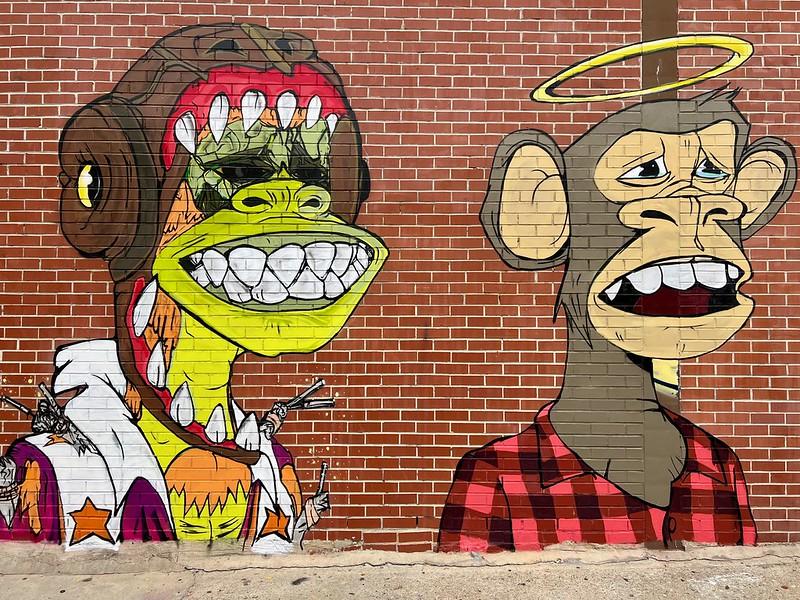Despite the explosion of news about NFTs, mainly over a handful of spectacular paydays a few pieces netted last year, the concept of NFT is still murky to the greater public.
Sure, people understand that NFT means 'non-fungible token' and they know that every NFT is a digital asset - property whose ownership is recorded on the blockchain... but how can you make money with something you can't hold in your hand, hang on your wall or keep as a rainy-day fund in case of emergency?
Such thinking limits the concept of NFTs to the traditional methods of earning and wealth-building. It doesn't take into account how much of the financial world has moved into cyberspace and onto blockchains; a trend that's set to grow. Nor does it take into account the possibilities inherent in blockchain technology and wealth-building for the masses.
Just look at all of the ways you can use NFTs to both earn and build wealth:
| How to Profit from NFTs |
|---|
| 1. Keep them as investments. |
| 2. Stake your NFTs lock them for a set period to earn rewards. |
| 3. Game with them: use your NFT in compatible games to earn cryptocurrency. |
| 4. Rent your NFTs out. |
| 5. Use your NFTs as collateral. |
| 6. Flip your NFTs: buy them at a low price and sell them at a higher price. |
| 7. Create NFTs; set them to earn royalties every time they're resold. |
These days, economists report that people are increasingly being shut out of investment possibilities and expounding on the idea that the economic playing field could never be levelled.
Let's not jump to hasty conclusions. First, we need to consider all the ways you could use NFTs to make money.

NFTs as Investments
The first, most obvious way to make money with NFTs is to keep them as investments, just as you would stock certificates and municipal bonds.
Experienced stock traders would tell you that getting in on the ground floor of any promising venture is a wise investment strategy. Another common piece of investment advice: ride it as it appreciates. Put together, those recommendations amount to buying NFTs now - preferably from artists with a decent sales track record and a well-populated collection, and simply keeping them.

As an example, consider CryptoPunks, an algorithm-created collection of 10,000 pieces. Today, these Punks are some of the hottest NFTs on the market and are largely responsible for driving the NFT craze but, when they debuted (in 2017), anyone with an Ethereum wallet could claim a Punk for free.
Nowadays, CryptoPunks are quite the status symbol around the NFT communities and they are making their way into the mainstream art world. They've even gone to Christie's for auction. Clearly, the formerly throwaway Punks are set to pull in big money. Imagine if you had snagged a free Punk five years ago, what it'd be worth today!
As you scan the NFT marketplaces for tokens to add to your collection, remember that not every digital artist is destined for greatness and not every collection will increase in value. In that sense, investing in NFTs is like investing in stocks.
But your investments stand a better chance if you know the best places to buy NFTs.
Staking Your NFTs
What do certificates of deposit, individual retirement accounts (IRAs) and pension plans have in common?
All of them involve setting a parcel of money aside for a pre-determined time, after which you may collect your money, along with the accrued interest that the financial institution owes, based on the terms agreed to when you opened the account.
The flip side of that process means that the financial entity you entrust your money to gets to use it for as long as they hold it. They might invest your cash, along with others' stakes, to generate profits for their institutions. Or they might lend that money out for a fee.
Staking your NFTs works the same way, but for one major difference. You retain ownership of your digital asset - as you would you cash but, by locking it in a decentralized finance (DeFi) platform, you'll receive rewards - as opposed to having to wait for your agreement to mature before collecting anything.
What rewards you can expect to earn depend on the type of NFT you stake and how many you offer up, as well as the platform you stake them on. Some platforms pay daily or weekly rewards and, should you offer up enough of a stake, you may even get to take part in the platform's governance.
To see if staking is suitable for you, you should check these sites out:
- Splinterheads
- Band NFTs
- NFTX
- Doge Capital
- Polychain Monsters
If you're already considering NFTs as a wealth-building vehicle - meaning that you want to buy them and hold onto them without selling or trading, staking your NFTs is a way to earn just a bit more.

Rent Your NFTs
Renting your NFTs works the same way as renting anything else: someone pays you a fee for the use of your digital property. Rental terms - for how long and for what purpose, are laid out in a smart contract. Once the contract expires, so does the rental.
Check here to learn about cryptocurrency on Superprof.

Let's say you own a game NFT - some of the most highly sought-after tokens. Unfortunately, now that the world is recovering from the pandemic-induced stillness, you have to return to your former busy life; you don't get to play every day. Why keep your NFT tucked away when you could rent it out so that someone who does have time to play can use it?
What if you don't own any gaming NFTs?
A part of the NFT mystique is the status they confer. Owners may show off their NFT by using it as their social media avatar or simply claim bragging rights because they own a piece from a renowned artist.
So, if someone asks to borrow your NFT to make a good impression on their partner's parents or give a tasteful flash of it at an upcoming conference, who says you should let it go for free?
If you have a sizable NFT collection, renting them out rather than keeping them in your wallet is something you can do with them.
Flip Your NFTs
House flipping isn't a new phenomenon but it's gained prominence in the wake of television shows, particularly in the US. It involves buying a property in any condition, making a few repairs and upgrades, and reselling it at a profit, all without the 'flipper' having lived in it.
Flipping NFTs works much the same way, without the obligation to modify or improve the newly-bought NFTs. It would be impossible to do that, anyway.
Ideally, flipping NFTs involves buying pieces from an up-and-coming collection; maybe even as it's being minted, and selling them at the right time. Timing is crucial; you won't be able to offload your NFT if nobody wants to buy it, and certainly not for a decent price.
Timing and the piece's utility are what determine success for a flipping venture. And what it will cost you.
If you venture into flipping, be sure to take into account the gas it will cost you, the fees for listing it and, if the original artist commands royalties from each resell, how much they amount to. That way, you can set your sale price to recoup your losses and make a profit, too.
Also, you have to know the best sites for buying NFTs; there's no point in listing your trove on a less-trafficked marketplace.
Gaming With NFTs
Ever since CryptoKitties launched in 2017, Game NFTs have been driving the NFT market. This delightful game calls for you to introduce your NFT kitty to the platform, after which you may trade it for a different cat, breed it with other cats and buy additional cats to keep your cat company.
When CryptoKitties exploded onto the gaming scene - it crashed the Ethereum network due to the game's traffic volume, a host of other NFT games have entered the fray: Gods Unchained, Axe Infinity and Gold Fever are just three of this year's hottest games.
NFT gaming lets you earn cryptocurrency or points that can be exchanged for crypto. Besides all the fun to be had and the coin you might earn, you may also be awarded NFTs beyond what you already have.
Be aware that, as you play, NFTs may go up or down in value so, if you're trading your NFT for another player's, be sure to check how much they're worth before you make your move, lest you lose money on the deal.

Create NFTs
Although digital art is not new, thanks to NFTs' elevated profile, they have become the talk of the town. Established digital artists are finally seeing decent paydays roll their way and new creators' collections are hitting the marketplaces all the time.
Why not get in on the act now, while the market is hot?
Unlike traditional artists who must undergo years of training and buy loads of supplies, digital artists only need their computer and suitable software to create art. Even if you're not wildly familiar with Photoshop or Corel Draw, you too could create visual art after only a few hours of trial and error.
And, if need, be, you could watch tutorial videos.
The point is, creating NFTs is not as hard as it seems or sounds. It'll likely take you a while to be of the same calibre as, say, Mike Winkelmann, AKA Beeple, but you can still develop your skills and hone your artistic vision to generate a new income stream.
You only need to learn how to make an NFT.
Summarise with AI:
















